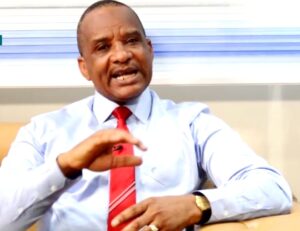By Joshua Yousouph
The Director General of the Nigerian Maritime Administration and Safety Agency (NIMASA), Dr. Bashir Jamoh has confirmed that Nigeria has been de-listed from the ‘red list’ of countries affected by piracy, and may no longer pay World Risk Insurance by the end of September 2022.

While speaking at the recent 16th Maritime Seminar for Judges, which held in Abuja Jamoh confirmed that between January and June 2022, zero incidents of piracy in Nigeria has been reported by the International Maritime Bureau (IMB); implying that Nigeria is now free from piracy.
War risk insurance is a type of insurance that covers damage due to acts of war, including invasion, insurrection, rebellion and hijacking. It has two components: war risk liability, which covers people and items inside the craft and is calculated based on the indemnity amount, and war risk hull, which covers the craft itself and is calculated based on the value of the craft. The premium varies based on the expected stability of the countries to which the vessel will travel.
Before the latest development, the NIMASA had contend that piracy in the country’s waters is on the decline, marine insurers had insisted on very high premiums for ships conveying cargo to Nigeria.
Oceans Beyond Piracy’s 2020 report shows that the total cost of additional war risk area premiums incurred by Nigeria-bound ships transiting the Gulf of Guinea was $55 million in 2020, while 35 percent of ships transiting the area also carried additional kidnap and ransom insurance totaling $100 million.
But, last week, the International Maritime Bureau (IMB) confirmed that there has been a drastic reduction in piracy in the Gulf of Guinea, where Nigeria is a leading nation.
In its half year report for 2022, the IMB reported that, “out of the 58 global incidents, 12 were reported in the Gulf of Guinea, 10 of which were defined as armed robberies and the remaining two as piracy.
However, Nigeria was consciously missing on the list of nations attacked by pirates, even in the Gulf of Guinea.
The NIMASA DG said this feat was achieved through constant engagement and collaboration between NIMASA, Nigerian Navy as well as other stakeholders. He stated that the reduction in piracy in Nigeria is also as a result of huge investments by the Federal Government which led to the deployment of the Deep Blue Project.
The NIMASA DG informed that the international community is impressed by this feat and Nigeria has signed a $2.78m grant from the Japanese government, including the acquisition of speed boats. He added that the Korean government has also donated warships to Nigeria as part of their contributions to the suppression of piracy in the Gulf of Guinea.
Jamoh however noted that the agency has employed the “Stick and Carrot” approach where through the enactment of the Suppression of Piracy and Other Maritime Offences (SPOMO) Act, 23 convictions have been recorded in less than two years. He added that a contract for the building of Skill Acquisition Centres in the six geopolitical zones have just been awarded to encourage people to desist from piracy.
In his words: “Last month, after we were removed from the red list of piracy, we are no longer the most dangerous waters to trade on in the whole world as it used to be. If you recall last year during the World Maritime day, that was the first time I started raising alarm that there was a drastic reduction of piracy in Nigeria and we will not continue to pay the World Risk Insurance fee. So what we need to do is for the insurance body to come up with the yardstick that makes Nigeria to be on the red list to pay world risk insurance.
Read Also: Why We Intercept Barges Carrying Containers On Waterways — Western Marine
“The issue of reduction in policy is as a result of so many factors and these factors include huge investments by the Federal Government. Look at the Deep Blue project, most of the countries in Europe and America come here to access it and gave us kudos. When the Japanese Ambassador visited, he was so impressed. Last week, I signed a $2.78m grant from the Japanese government because they are impressed with what we have put in place. He signed an agreement with the Federal Ministry of Finance, Budget and National Planning. They promised to donate speed boats for security measures in our country worth about $2.78m. The Korean government also gave us warships as their own contributions. South Korea also gave us ships; yet to be brought to Nigeria. This implies that the international community appreciates what Nigerians is doing”.
Giving further insight, Jamoh said: “From those components, they should use it to gauge us and reduce the War Risk Insurance. They claimed we have been on the list for more than 25 years and a short time cannot be a yardstick to remove the War Risk Insurance, adding that we shouldn’t bring a few examples. We compiled our report and they told us last month that they have concluded their Executive Council meeting for the second quarter and by the third quarter in September, they are going to consider other countries. They asked us to bring up our Short, Medium and Long term plans that will convince them that we have permanent and sustainable reasons to maintain the yardstick of the drop in piracy, so they can then remove the War Risk Insurance”.
Speaking further, he added: “That is why I said hopefully by the end of September, we should be able to rejoice and Nigeria can see a drastic reduction in terms of the freight rates we are paying. Since Nigeria is an import-dependent country, it is going to affect everything we’re buying and I hope that the importers will reciprocate the gesture by reducing the cost element of the items we are consuming, because of the reduction in the world risk insurance”.
Kindly like us on Facebook















